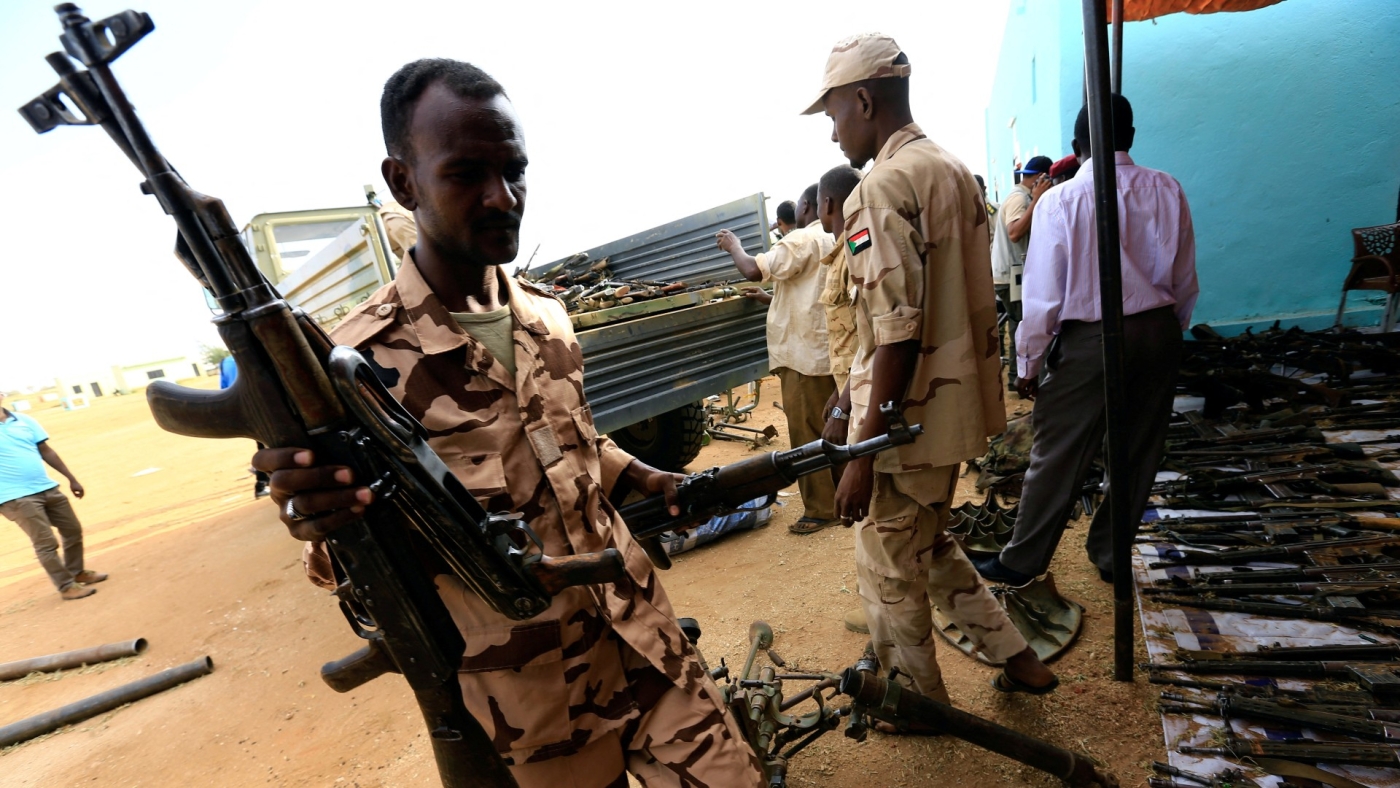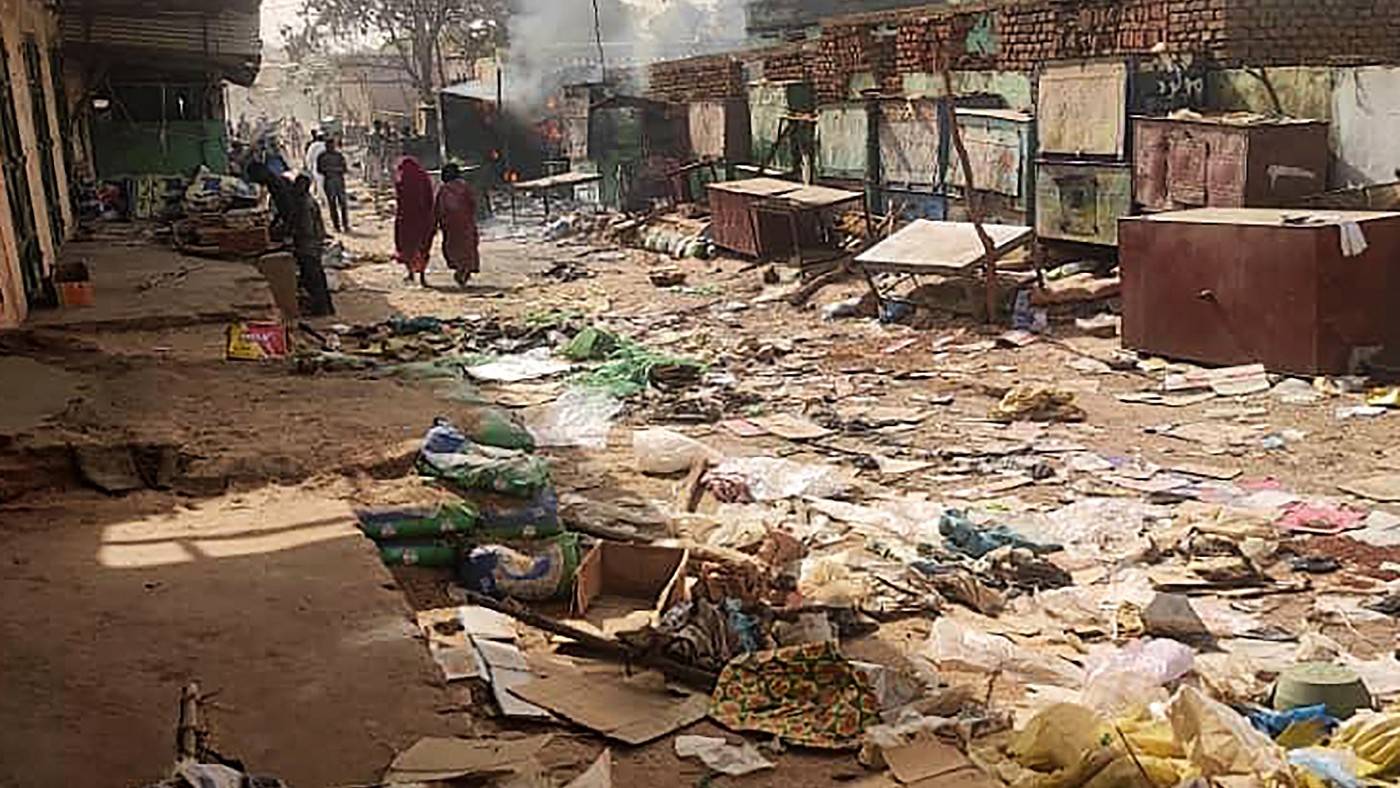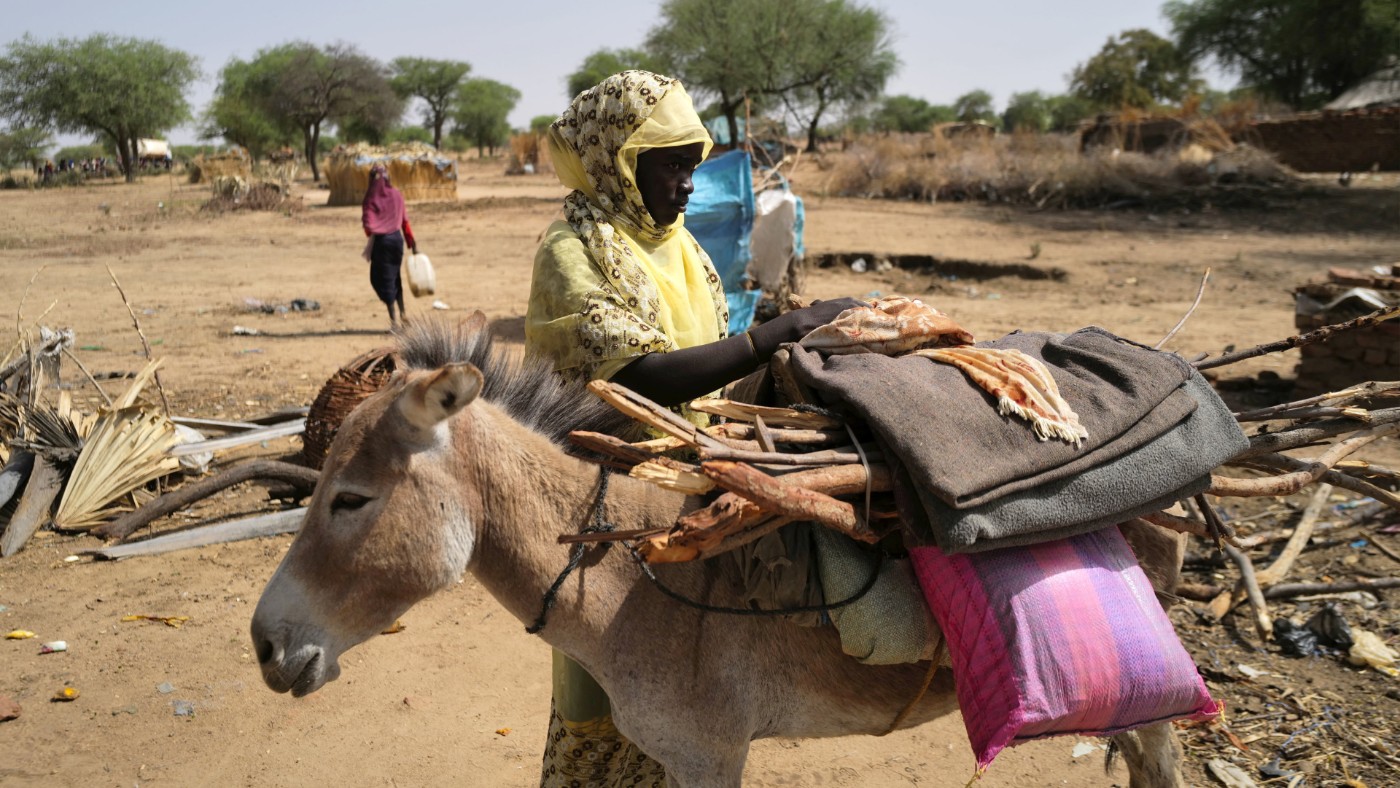Mohammed Amin
 Sudan’s warring factions are engaged in a fierce and complex battle for local and regional support in Darfur, as fighting intensifies in the country’s western region.
Sudan’s warring factions are engaged in a fierce and complex battle for local and regional support in Darfur, as fighting intensifies in the country’s western region.Sources in Darfur and the countries it borders have told Middle East Eye that the Rapid Support Forces (RSF) paramilitary led by General Mohamed Hamdan Dagalo, commonly known as Hemeti, is receiving support from eastern Libyan commander Khalifa Haftar, Russian military outfit Wagner and the government of the Central African Republic (CAR).
An Egyptian military source has told MEE that Egyptian pilots are flying Sudanese air force planes, with the relationship between the armies of Egypt and Sudan a longstanding one. The Sudanese military denies its planes are being used by Egyptian pilots.
The government of Chad is aligned with General Abdel Fattah al-Burhan, commander of the Sudanese Armed Forces (SAF), but the RSF is drawing in fighters from Sudan's neighbours.
Adding to the tangled web of support and sabotage are powerful Sudanese leaders from Darfur, including Musa Hilal and Minni Minnawi, both of whom have joined the Sudanese army to form what analyst Kholood Khair called an “anti-Hemeti coalition”.
Another key figure is Sudanese Finance Minister Gibril Ibrahim, leader of the Justice and Equality Movement (JEM), whose home territory is Darfur and Kordofan.
Both the army and RSF accuse each other of getting external support while denying they receive any themselves.
This comes after at least 280 people died over the weekend in El Geneina, the capital of West Darfur, following an attack by an armed militia dressed in the uniform of the RSF.
Almost a thousand people have now died in Darfur since the conflict between the Sudanese army and RSF began on 15 April.
Last Thursday night’s Jeddah agreement, which was not a ceasefire and which activists told MEE was “meaningless”, has done nothing to quell the violence.
Within Geneina, an estimated 100,000 internally displaced people remain trapped, with settlements once again being reduced to ashes, the Norwegian Refugee Council (NRC) said.
 People walk among scattered objects in the market of El Geneina, the capital of West Darfur, on 29 April 2023 (AFP)
People walk among scattered objects in the market of El Geneina, the capital of West Darfur, on 29 April 2023 (AFP)After Khartoum, Darfur is currently the site of the war’s fiercest fighting. The homeland of the RSF, it is where the paramilitary has its strongholds and sources of supplies, logistics, weapons and fighters.
The region, which has been wracked by civil war for almost the whole of the 21st century, is vital strategically, as it shares a border with Libya, Chad, CAR and South Sudan, and is close to Egypt, Sudan’s largest and most influential neighbour.
“Darfur is going to be one of the biggest battlegrounds outside Khartoum and it is important to both sides, even though the SAF can concentrate the fighting in Darfur and leave it there, very much as we have seen over the last 20 years,” Khair, director of Khartoum-based think tank Confluence Advisory, told MEE.
“If they can get the RSF to leave Khartoum, which is by no means simple, I think the army would be happy to have most of the fighting take place in Darfur because, firstly, their main target is Khartoum, and secondly they have been able to work to get support from Arab tribes in Darfur,” Khair said.
A key figure in this strategy is Musa Hilal, a former Janjaweed militia leader who is an enemy of Hemeti, who together with Minnawi and Gibril Ibrahim can create an anti-Hemeti coalition in Darfur, the Sudanese analyst said.
"Hemeti cannot rely in the same way on his ethnic mobilisation among Arab troops, as he could before.”
Libya, Wagner and Haftar
On the borders with Libya, the Sudanese army has engaged in an aggressive battle against the RSF, capturing a military base called Chevrolet in the early days of the conflict.
Located in the triangle between Sudan, Libya and Egypt in the Gabal El Uweinat mountain range, the base is strategically located on the migration route north through Libya to the Mediterranean, with the RSF using it to target refugees and human trafficking operations.
Sources from rebel factions in Darfur that maintain a presence in southern Libya told MEE that the Libyan general Khalifa Haftar pushed his forces towards Sudan, promising the RSF that he would provide them with advanced anti-aircraft cannons.
The SAF bombed Haftar’s convoys and closed the border from Chevrolet, the sources said.
The same sources said Haftar is being supported by the Wagner Group in order to send weapons to the RSF near the border between Sudan and Libya.
'Wagner has sent weapons and reinforcements to RSF across the border. RSF, Wagner and the CAR army has met on the border'
- Rebel source in Central African Republic
“We have the right to defend our country from any external interference,” an army source said when asked by MEE to comment on the allegations.
“In Libya, there’s some support in the form of fuel and arms coming in from Haftar’s troops,” Khair said on the connection between the groups.
RSF spokesperson Musab Mohamed Ahmed has denied the claims, saying that the paramilitary does not get any external support.
Accusations of external support have been thrown around on all sides. The RSF said its base in the Red Sea state was bombed by the Egyptian air force. While the SAF denies the claim, an Egyptian military source has told MEE that Egyptian pilots are flying Sudanese air force planes.
Another element in Libya, Khair said, was the return to Sudan of troops loyal to Darfuri politician and military leader Minnawi. Those men had been fighting in Libya for Haftar and are “coming back to Darfur to support Minnawi, not Hemeti,” Khair told MEE.
Minnawi, head of the Sudan Liberation Movement (SLM), said in March that he would not disarm his combatants, as was meant to happen under the Juba peace agreement signed in 2020. He pointed to what he called “ongoing recruitment campaigns” in Darfur by other groups, including the RSF, as the reason for this decision.
Minnawi has positioned himself as a potential peacekeeper, though he is thought by many to be supporting Burhan, who was instrumental to his return to Darfur.
Border support from Bangui
The border between Sudan and the Central African Republic is currently more active, with the CAR army, which is backed by Wagner, sending weapons and munitions across the border to support the RSF, according to opposition sources in CAR.
The Wagner Group supports both Haftar and the government of President Faustin-Archange Touadera in Bangui, the capital of CAR.
“Wagner has sent weapons and reinforcements to RSF across the border. RSF, Wagner and the CAR army has met on the border and agreed that the support can enter Sudan through Um Dafuq, which is already controlled by the RSF,” two sources from the Coalition of Patriots for Change (CPC), a collection of rebel groups in the Central African Republic, told MEE.
'Darfur is going to be one of the biggest battlegrounds outside Khartoum and it is important to both sides'
- Kholood Khair, Confluence Advisory
“Our forces as CAR opposition are fighting Wagner and the CAR army forces, so we are also seeking coordination with the Sudanese army in order to stop the mutual support that CAR government, Wagner and RSF are providing to each other,” the CPC sources said.
“In Central African Republic, the situation is more straightforward. They are on the side of Hemeti, who we are told has been able to recruit some Arab fighters there and to get some support from the border regions, which the RSF has been closely monitoring and shutting and opening when it is politically convenient for them,” Khair told MEE.
Musaab Mohamed Ahmed, the Rapid Support Forces spokesperson, dismissed the allegations, adding that the RSF has no ties with Wagner and hasn’t received weapons from the neighbouring countries including Libya or CAR.
“We have nothing to fight with apart from our guns and military vehicles, in addition to our fighters. This is the truth and everything that you’ve heard is rumours spread by our enemy,” he told MEE.
Chad and Hemeti
At the beginning of the conflict, Chad closed its 1,403km-long border with Sudan and called for calm.
The border has proved to be porous though, with fighters crossing it and clashes taking place close to it.
Chadian forces, including those government troops that have participated in joint Sudanese-Chadian forces on the border, support the SAF, leading the RSF to bring in more reinforcements from neighbouring countries.
Hemeti, whose family’s origins lie in Chad, has a cousin who is a Chadian general. But the RSF leader is feared by the Chadian government of Mahamat Idriss Deby, which does not want to see the Sudanese paramilitary leader extend his influence across the border and help enact regime change.
The deadly fighting in El Geneina, which is less than 30km from Sudan’s border with Chad, has seen Chadian fighters who are part of Arab militias taking arms against the Sudanese army.
 Sudanese seek refuge from war in Chad (Reuters)
Sudanese seek refuge from war in Chad (Reuters)Minnawi, Musa Hilal and the Justice and Equality Movement (JEM) are all old enemies of Hemeti and the RSF.
Sources close to the rebel movements in Darfur said that the army was looking to gather the support of these local groups in order to counter the RSF in western Sudan.
The sources said that the signatories of October 2020’s Juba peace agreement, including Minnawi’s Sudan Liberation Movement, JEM and the Sudan Liberation Movement-Transitional Council, have joined forces in order to be deployed in North Darfur to separate the army and the RSF.
Minnawi, as a governor of the region, said that the peacekeeping forces would also be deployed to the other five capitals of the region, including El Geneina, El Fasher and Nyala.

As the homeland of Hemeti and the RSF, Darfur is a natural place for the paramilitary force to withdraw to if they are overwhelmed in Khartoum. It is also a source of fighters and supplies, including from Libya and Chad. Khartoum, in the centre of Sudan, is harder to supply.
“I don’t think the RSF is controlling Darfur. I don’t think they can,” Khair said.
“I think it has spread itself thinly across the country but will come back to regroup in Darfur because it can still recruit from there and from near there,” she said, referring to Arab tribes in North and South Kordofan, but adding that the RSF did not have as much support there as previously.
“This makes the situation in Darfur very likely to escalate,” Khair told MEE.
“It’s already difficult now, it’s one of the first places we are seeing ethnic mobilisation take place and we are seeing much more of a civil war scenario [there] compared to Khartoum, where it is two armed actors fighting it out in a civilian setting rather than a civil war.”
Sources in Darfur echoed the analyst, saying that if the RSF withdraws from Khartoum to the western region, the dynamics of the war will change and other rebel movements will be drawn fully into the conflict.
In Darfur, where war never really ended, the stakes could not be higher.
No comments:
Post a Comment